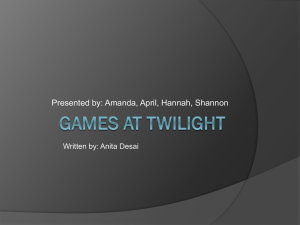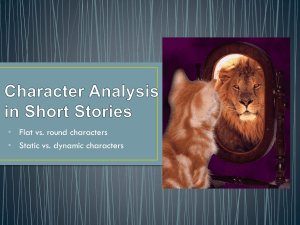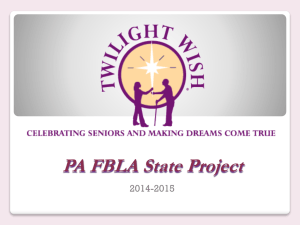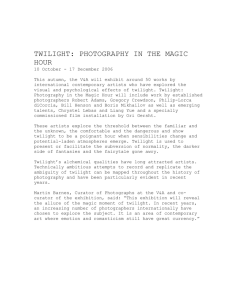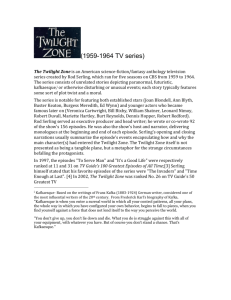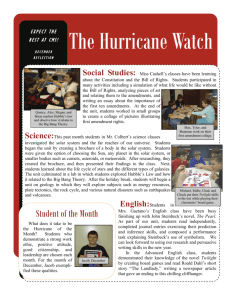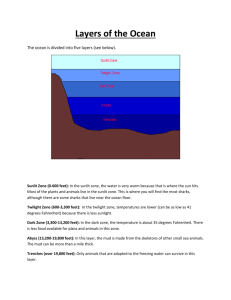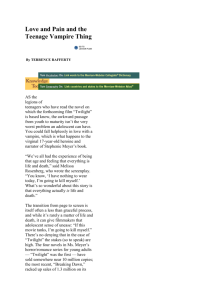Week 10 section
advertisement
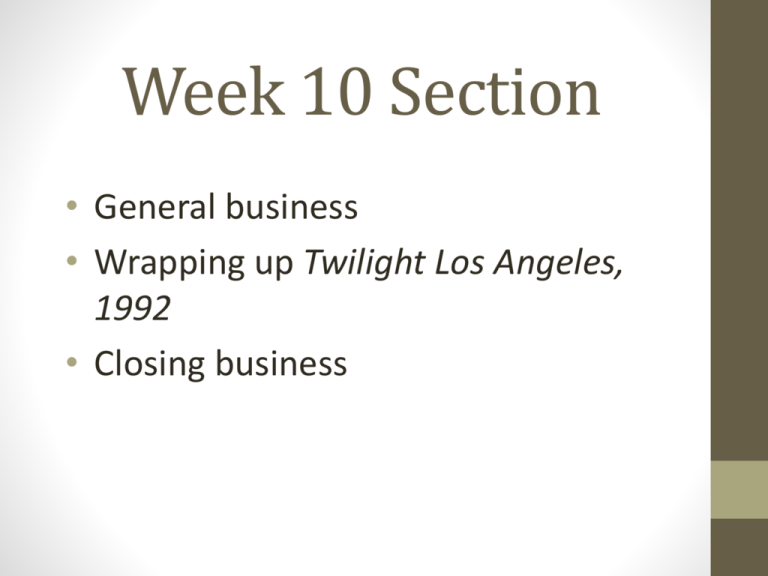
Week 10 Section • General business • Wrapping up Twilight Los Angeles, 1992 • Closing business General Business REMAINING OFFICE HOURS • Thursday 6/2: 3:30 to 6:30 PM • Friday 6/3: 10:00 AM to 2:00 PM; 3:00 PM to 4:00PM • Saturday 6/4: out of town; e-mail me • Sunday 6/5: noon to 6:30 PM (at Starbucks on Regents) • Monday 6/6: 8:00 AM to 6:30 PM PAPER 2 DUE BY NOON *you can give me your paper; SASE optional • Tuesday 6/7: 10:00 AM to 2:30 PM FINAL 3:00-5:59 PM (in usual lecture room) Translation and Perspective • In . . . And the Earth Did Not Devour Him: • We’ve talked about the vignette structure with different voices providing perspectives on the lives of migrant farm workers, in particular, as well as racial and cultural “others” more generally. • We’ve talked about what’s lost in translation as the translator frames Rivera’s story through her word choices. • We’ve talked about how the moviemakers frame the story by making it more of a narrative about the boy and his family. • In Bone: • • • • Leila translating for her family Leila translating for school (for her job) Leila translating as the narrator to the audience (and Ng translating as author) Translating lives through paper records and memory • In Twilight: • Multiple voices translating different perspectives on the events leading up to, including, and following the Rodney King beating (make sense of it for others and for oneself) • • • • • • Media giving particular perspectives Different communities giving perspectives (often related to race and class dynamics) The courts and jurors framing the events Maxine Waters reaching out to President Bush to tell him what it’s all about Even Reginald Denny having to be told what happened when he was beaten Smith’s perspective in introduction and giving us language and bodily cues in parentheses throughout some of the pieces so we can hear/see people. Imposes a particular order onto the stories for us and formats them a bit like poetry. The events “would be variously referred to as a ‘riot,’ an ‘uprising,’ and/or ‘a rebellion’” (xviii)—import of words/labels. Twilight—Structure • Introduction by Smith before the text proper • Prologue • Establishing continuity and defining the “enemy” • The Territory • Backstory—focusing on history of police brutality, class, and gang violence; continues perspectives on “enemy” and “they” • Here’s a Nobody • More focused on Rodney King’s beating (includes his aunt, the police, witness, juror) • War Zone • Aftermath of the not-guilty verdict—destruction in LA, Denning’s beating, perspectives re: Korean and black relations • Twilight • Aftermath, clean-up work, questioning what now • Justice • People looking back—a lawyer on taking the case, Mrs. Young-Soon Han on justice for Korean business owners, on youth, on gang and race warfare *Note the timeline of events from 1991-1992 at the end; discusses shooting of Latasha Harlins, Rodney King beating, and Reginald Denning beating Twilight—More context • The professor mentioned 3 key factors: • History of policing and police brutality in L.A. • Economic restructuring • Demographic shifts • Gang violence is a recurring theme/topic in the text. How does that link to these factors, and did any details re: gang violence resonate with you as you read? • Watts riots of 1965—recall Yamamoto’s references to the Watts riots in “A Fire in Fontana.” • The week-long incident itself revolved around Marquette Frye, an African American motorist who was pulled over and seemed to be drunk. Brother Ronald Frye wanted to take the car home as his brother was arrested, but the police refused; brothers and their mother were arrested as a crowd gathered. Unrest soon escalated, beginning mostly with stone-throwing and vandalizing police property; then there was looting and burning, mostly of businesses but some residences. • BUT this was the product of growing tensions similar to those in 1992 rather than revolving around one “isolated” incident. • 34 killed, 1,032 injured, 3,438 arrested. 1992 numbers surpassed these a bit, and in both cases the National Guard was called in. Twilight • What is the significance of twilight? Twilight—re: twilight “Twilight #1”—Homi Bhabha (famous postcolonial studies scholar), 232-34 • “That fuzziness of twilight allows us to see the intersections of the event with a number of other things that daylight obscures for us, to use a paradox. We have to interpret more in twilight” (233). “Magic #2”—Betye Saar, 235-36 • “It was, um, still light, because it didn’t last for a very long time. So it’s like this sort of in between day and night when the sky is sort of gray and we were walking back to the car” (235). Confronts scene of protesters in West Hollywood but refocuses on sky: “That’s kind of what I remember about the sky, the kind of surreal time of day, because it’s between day and night . . . . It’s very surreal, I think, or maybe even magical. But magic is not always good, because it implies all sorts of things, like evil and control” (236). “Limbo/Twilight #2”—Twilight Bey (gang member), 253-56 (and intro) • People say he has “a lot more wisdom than those twice your age,” so he takes “twi” from “twice” and “light” signifying knowledge and wisdom. “So twilight is that time between day and night. Limbo, I call it limbo” (254). “I affiliate darkness with what was first, because it was first, and then relative to my complexion. I am a dark individual” (255). Twilight—Priorities • “I Was Scared”—Anonymous Young Woman, USC student • “I was scared to death. I’ve never felt as scared, as frightened, in my life. Um, and it was a different fear that [than?] I’ve ever felt. I mean, I was really afraid. At a certain point it dawned on us that they might try to attack the row, the sororities and the fraternities. Because they did do that during the Watts riots. And, um, they . . . they went into the house, where they smashed the windows. I don’t know how we got this information but somebody knew that” (156). • SHIFT “First of all, my parents were on their way . . . All I can think of . . . one bottle, one shear from one bottle in my father’s car, he will die! He will die” (157). • MORE CLARITY “And those are his pride and joy. They are perfect. They are polished. They are run perfect. They are perfect. All I can think of is a bottle gettin’ anywhere near it” (158). *So much of the entire text of Twilight and the context of the events themselves boils down to priorities, and this is an extreme yet poignant illustration of how that works and what it means. Twilight—Masculinity and Urban Soldiery • “A Bloodstained Banner”—Cornel West (scholar, actor, author) • “Richard Slotkin talks about dis in terms of being a gunfighterr (grabbing the ‘r’) nation. . . . To be like Rambo, . . . this kinda gangsterous orientation, . . . gangster rap, which is deeply resistant of, uh, against racism and so forth but so centered on machismo identity because you tough like a soldier, you like a, uh, military mayan” (42-43). See Slotkin’s Regeneration through Violence, for example. • “therefore the interests of black women are subordinated and the black men become the machismo heroes, because they’re the ones who defy and women can’t do that. . . . So you get this encounter between two machismo heroes [black men vs. police or hegemonic power]” (44). • “Broad Daylight”—Anonymous Young Man (former gang member) • “they thought ain’t nobody that stupid to shoot people in broad daylight. And I was the opposite. My theory was when you shoot somebody in broad daylight people gonna be mostly scared” (26). • “Ask Saddam Hussein”—Elaine Brown, former Black Panther Party leader • “I think people do have, uh, some other image of the Black Panther Party than the guns. The young men, of course, are attracted to the guns” (227). • “So don’t get hung up on your own ego and your own image and pumping up your muscles and putting on a black beret or some kinda Malcolm X hat or whatever other regalia and symbolic vestment you can put on your body” (231). Twilight—Protection • “Godzilla”—Anonymous Man #2 (Hollywood agent), 134-41 • Privileged whites fearing ambiguous “they” who are looting and burning. He feels guilty about the state of race relations as other whites are fleeing as though chased by Godzilla, “talking about the need for guns to protect ourselves” (136). • “The Beverly Hills Hotel”—Elaine Young, real estate agent, 150-55 • Goes on a date to the Beverly Hills Hotel and stays there. The privileged are “talking and trying to forget what was going on” (152). Seek protection there and try to forget, then try to protect yourself from people’s outrage when they attack your sense of privilege. • “I Remember Going . . .”—Rev. Tom Choi, 201-03 • Puts on his clerical collar: “I remember doing that specifically because I was afraid that somebody would mistake me for a Korean shop owner and . . . And, um, either berate my physically or beat me up. So I remember hiding behind this collar for protection” (201). Then realizes he doesn’t need it to be safe. • “A Jungian Collective Unconscious”—Paula Weinstein, 204-13 • “what disturbed me . . . was watching rich white people guard their houses and send their children out of L.A. as if the devil was coming after them. And it wasn’t realistic. It was, I think, a media fest of making white people scared of the African-American community” (211). • Carl Jung (Swiss) re: analytical psychology, collective unconscious, synchronicity Twilight—Rooms • “A Weird Common Thread in Our Lives”—Reginald Denny, beaten by the LA Four Plus, 103-12 • “Someday when I, uh, get a house, I’m gonna have one of the rooms and it’s just gonna be of all the riot stuff and it won’t be a blood-and-guts memorial, it’s not gonna be a sad, it’s gonna be a happy room. Of all the crazy things that I’ve got, all the, the love and compassion and the funny notes and the letters from faraway places, just framed, placed, framed things, where a person will walk in and just have a good old time in there. It’ll just be fun to be in there, just like a fun thing, and there won’t be a color problem in this room” (111). • “Trophies”—Paul Parker, Free the LA Four Plus Defense Committee, 170-79 • “Now we got some weapons, we got our pride. We holdin’ our heads up and our chest out. We like yeah, brother, we did this! We got the gang truce jumpin’ off. Basically it’s that you as black people ain’t takin’ this shit no more. . . . [I]t was some victory. I mean, it was burnin’ everywhere. . . . When I finally get my house I’m gonna have just one room set aside. It’s gonna be my No Justice No Peace room. Gonna have up on the wall No Justice over here No Peace, and have all my articles and clippings and, um, everything else. I guess so my son can see, my children can grow up with it. Know what Daddy did” (177). Twilight • Lots of overlap with other course material from this quarter, and the professor will perhaps draw connections across the course material in tomorrow’s lecture, like: • • • • • • • • • • • Power structures, repression, segregation, force, contact The rhetoric of warfare Making the invisible visible Mediation, perspective, narration (including media & technology) Violence Activism Othering (“them”) Intersections of race and class Gender (masculinities and femininities) Community, solidarity, identity Space and place (geographies and ideologies) Closing Business • Final exam review sheets (hard copies and posted on the course website) • We haven’t gotten to Alexie yet (tomorrow’s lecture), so do fill in some of the terminology and key quotes based on lecture. • 90% of the time when I mention page numbers or quote something, it’s because the prof explicitly read that part in class (so those are the most likely passages to show up as IDs versus text she didn’t read aloud). • I’m happy to meet with individuals or small groups to discuss the readings as preparation for the final. I have office hours all the way up to final exam time next Tuesday. • Thanks for your hard work and good humor, and for an amazing quarter—for me. Hopefully for you, too. Maybe? Oh, well . . .
